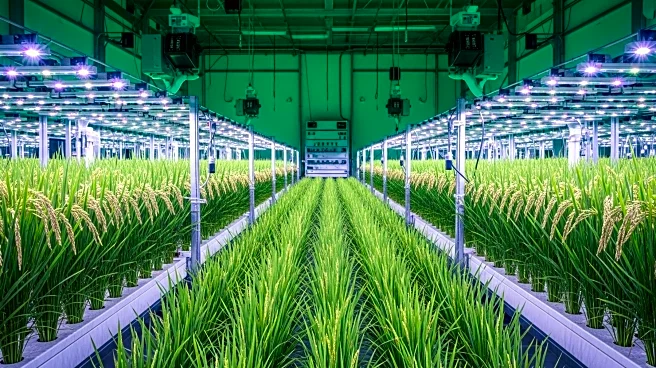What's Happening?
The Italian Space Agency (ASI), in collaboration with the University of Milan, Sapienza University of Rome, and University of Naples Federico II, is pioneering the Moon-Rice project. This initiative focuses on developing a super-dwarf rice plant, engineered to thrive in confined spaces such as space modules and harsh Earth environments. The rice plant, measuring only 10 centimeters, is designed to provide essential nutrients for astronauts on long-duration space missions and to bolster food security in extreme terrestrial conditions. The project employs advanced genetic techniques, including CRISPR-Cas edits, to enhance the plant's architecture and nutrient density. Early results presented at the Society for Experimental Biology Annual Conference in Antwerp have been promising, indicating potential success in both simulated microgravity and controlled-environment agriculture.
Why It's Important?
The Moon-Rice project addresses critical challenges in space exploration and global food security. For space missions, providing fresh, nutrient-rich food is essential for astronaut health and mission success, reducing reliance on shelf-stable foods. On Earth, the ability to cultivate crops in extreme environments could significantly impact food security, particularly in areas with limited agricultural resources. The project's success could lead to advancements in controlled-environment agriculture, offering sustainable solutions for urban hydroponics and arid regions. This innovation not only supports space exploration but also contributes to addressing global food shortages and resource management.
What's Next?
The Moon-Rice project is set on a four-year timeline, with ongoing trials to test the rice plant's performance under simulated microgravity and spaceflight conditions. If successful, the rice could transition from space labs to mainstream agriculture, providing a viable crop option for controlled environments on Earth. The project's progress will be closely monitored by the scientific community, with potential implications for future space missions and agricultural practices. Further research and development will focus on optimizing the plant's growth and nutrient profile, ensuring its adaptability to various environments.
Beyond the Headlines
The development of Moon-Rice highlights the intersection of space technology and agricultural innovation, showcasing how advancements in one field can benefit another. The ethical implications of genetically modifying crops for specific environments raise questions about biodiversity and ecological impact. Additionally, the project's success could influence cultural perceptions of food production, emphasizing the importance of sustainable practices in both space and terrestrial agriculture.











